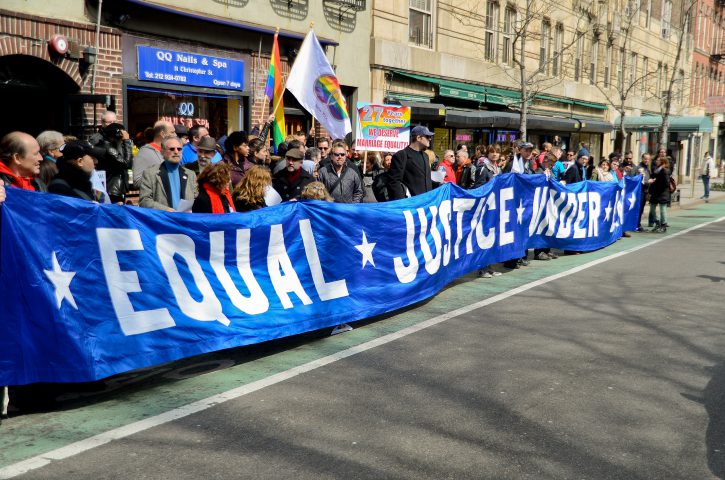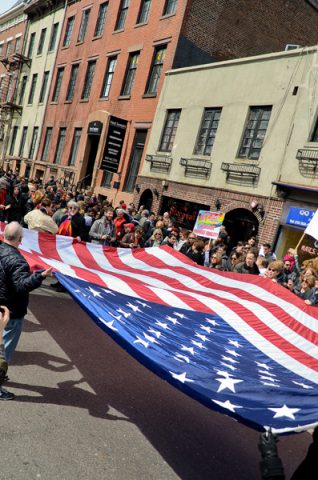The Supreme Court heard two of the most important cases in the history of LGBT rights in March, a historical event that elicited strong emotions on either side of the marriage debate.
Although both lawsuits involve different groups of people and separate jurisdictions, advancing or denying LGBT civil rights is at the heart of each. Hollingsworth v. Perry asks whether gay couples in California have the right to marry, challenging Proposition 8, the 2008 state law that took away that right. Windsor v. U.S. argues that the federal Defense of Marriage Act (DOMA) unfairly discriminates against legally married same-sex couples.
On March 24, NYC activists assembled at the historic Stonewall Inn for a rally and march to Washington Square Park in support of marriage equality. Appropriately, the demonstration kicked off at Ground Zero of the LGBT movement, the picture-perfect venue to decry DOMA, before the Supreme Court began its pivotal deliberations.
The NYC rally, one of more than 170 anti-DOMA demonstrations nationwide, featured a who’s who of New York politicians, including US Representative Jerrold Nadler, Assembly Member Danny O’Donnell and State Senator Tom Duane. All participants joined together for a common cause: legalizing gay marriage.
Nadler, who sponsors the House bill to repeal DOMA, spoke with gusto. “We’re here today to voice our unwavering support for Edie Windsor and for the rights for all Americans to marry whoever they choose, whoever they love,” he said, over enthusiastic cheers and applause. “The progress in this is exorable and inevitable. It’s our job not to relax noting its inevitability. It’s our job to redouble our efforts … so that people today can enjoy the benefits of equality and liberty.”
“We had more than 80 nonprofit and political groups coming together for this watershed moment in gay rights history,” said Stacy Lentz of Stonewall, one of the rally organizers. “We really wanted to send a message to the Supreme Court that DOMA is unconstitutional and treats us as second class citizens.”
At the Supreme Court two days later, justices heard arguments in Hollingsworth v. Perry. Court analysts came away with the feeling that a majority of justices saw Prop 8 as unconstitutional and unnecessary.
Consider Justice Sonia Sotomayor. When Prop 8 attorney Charles Cooper argued his case, the justice derailed his flawed logic. “Outside of the marriage context, can you think of any other rational basis, reason, for a state using sexual orientation as a factor in denying homosexuals benefits or imposing burdens on them?” she asked. “Is there any other rational decision-making that the government could make? Denying them a job, not granting them benefits of some sort, any other decision?” Cooper stumbled in response: “Your Honor, I cannot. I do not have any—anything to offer you in that regard.” Well done, Your Honor, well done.
Prop 8 has little left to stand on, particularly since the state of California declined to defend it before the Supreme Court. President Obama adopted a similar stance with DOMA, leaving House Republicans to mount a defense. Unfortunately, the Justice Department is still enforcing the law while it’s under review.
Chief Justice John Roberts questioned Obama’s position on DOMA, suggesting a double-standard during arguments in Windsor v. U.S.: “If [Obama] has made a determination that executing the law by enforcing the terms is unconstitutional, I don’t see why he doesn’t have the courage of his convictions and execute not only the statute, but do it consistent with his view of the Constitution, rather than saying, ‘oh, we’ll wait till the Supreme Court tells us we have no choice,’” he pointed out.
On the second day of arguments, Justice Anthony M. Kennedy said that he, like the majority of Supreme Court justices, believes that DOMA has infringed too deeply on the matter of states’ rights. According to Kennedy, federal law gives states authority in cases of individual law, such as marriage. By making DOMA a federal law, it infringes upon the rights of those states that have either legalized or banned gay marriage. Therefore, state sovereignty is the issue—rather than civil rights —that prompts the Court to reassess DOMA.
This line of reasoning is accord with the four justices who lean toward a liberal interpretation of LGBT rights, such as Ruth Bader Ginsberg. The 80-year-old Brooklynite quipped about “skim-milk marriage” when she asked “what kind of marriage is this?” if a surviving spouse cannot determine matters of child support, death benefits and Social Security.
In a notable about-face, former President Bill Clinton, who signed DOMA into law, is now calling for its repeal—a testament to shifting public attitudes. In an op-ed for The Washington Post, he wrote, “When I signed the bill, I included a statement with the admonition that ‘enactment of this legislation should not, despite the fierce and at times divisive rhetoric surrounding it, be understood to provide an excuse for discrimination.’ Reading those words today, I know now that, even worse than providing an excuse for discrimination, the law is itself discriminatory. It should be overturned.”
The Supreme Court is expected to rule on DOMA and Prop 8 in June.




What Do You Think?